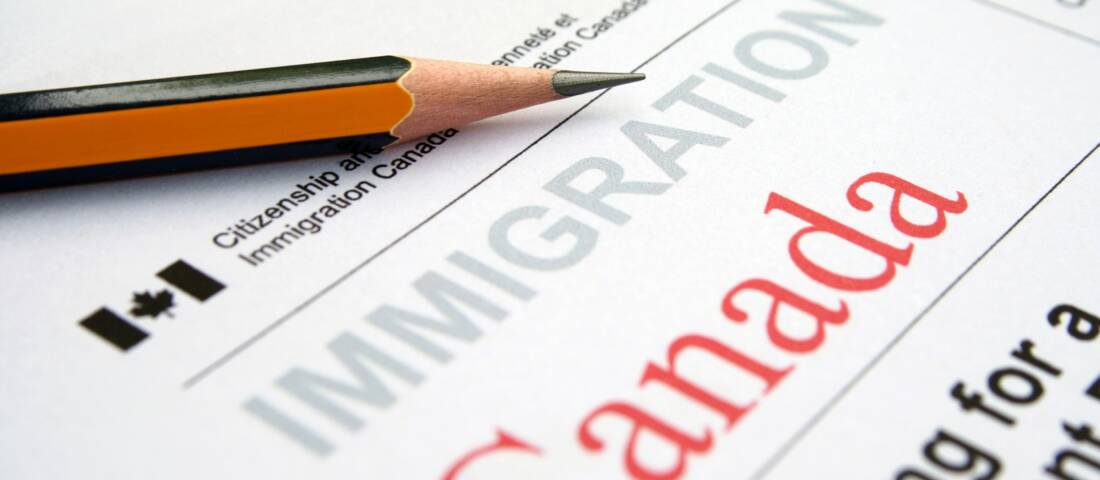Canada immigration lawyer Evelyn Ackah spoke to the Facebook Group Ask Immigration on September 29, 2020, hosted by founding member Dr. Alka Chopra Madan, founder of Global Women Power, and Nancy Tobesman, Vice President at Global Women Power, about how Indian foreign workers and business owners in the United States can move to Canada to work or open a business, and then make Canada their permanent home.
Ask Immigration is a Facebook group network of high-tech and IT professionals and business owners from India. The conversation included immigration topics:
- Differences in U.S. and Canada immigration
- How H-1B visa holders and applicants can move to Canada
- NAFTA immigration to Canada
- Tech immigration to Canada
- Global Talent Stream
- Express Entry
- Spousal and Family
- Intra-company transfers
- Student visa
- How to set up a business in Canada
BOOK An Initial Call with a Client Engagement Coordinator
WATCH: Canada immigration lawyer Evelyn Ackah explains how Indian tech workers and business owners can move from the U.S. to Canada:
Ackah Law Can Help Your Canadian Dream Come True
For more information on moving to Canada from the United States as a tech worker or small business owner, contact us today at (403) 452‑9515 Ext. 100 or 1-800-932-1190 or email us directly.
Transcript:
Dr. Alka Chopra Madan:
And I welcome you, attorney Evelyn Ackah today with us talking about Canadian immigration.
Evelyn Ackah:
Thank you.
Dr. Alka Chopra Madan:
Yes. I'm not sure how much you know that people in the U.S. are so keen to know more about immigrating to Canada, because the group we have, its name is Ask Immigration. And most of the people in here are IT professionals. And as soon as this new government started, and the immigration started having all the throwbacks, rules changing, and people just... Every new rule change, people freak out, and the best option for them at that time is to go to Canada.
Evelyn Ackah:
Absolutely. Yes.
Dr. Alka Chopra Madan:
And-
Evelyn Ackah:
Start to talk about Canadian immigration.
Dr. Alka Chopra Madan:
Yeah, and I have been observing Canadian immigration also. That also keeps changing quite frequently. New rules come up, numbers increase, decrease. Province wise, it is different. So just for me, it is pretty complicated, Canadian immigration. So that's why we are having you over.
Evelyn Ackah:
Thank you.
Dr. Alka Chopra Madan:
Just make it simple for us.
Evelyn Ackah:
Of course, I'd be happy to. Thank you so much for the opportunity, Dr. Alka Chopra Madan, I really appreciate it. I think the U.S. immigration is much more complicated than Canadian immigration. It's A to Z immigration, different visa types. In Canada, we've... I've been doing this for 22 years, is pretty consistent now. And there's always some small nuances or changes, but nothing is major that affects people's lives the way that some of the changes in the States have. We are definitely hearing from people looking to come to Canada from the United States, especially from the Silicon Valley, California, and other states, as they'd consider what the outcome of this election will be. They want to just know what their options are. And so, that's been very common. Many H-1B visa holders, if they have a good employer that wants to keep them, we can talk about ways to nearshore them to Canada.
Evelyn Ackah:
First, maybe as workers under our program of intra-company transfer, similar to your L-1 category, or even if they are maybe American citizens also looking under NAFTA Professional, similar to your TN, we can also bring them to Canada. But once they're in Canada, our process based on the province is usually within 12 months of working in Canada, they become eligible to apply for permanent residence. So it's much faster than it is for you in the States to get to a green card. For us, it could be two years, two and a half years, and you've gained your permanent resident status.
Dr. Alka Chopra Madan:
That's very nice, too. And in employment also, I heard many new programs are coming up. I know about the nearshoring, what you're saying. And also, there is a new process which is called Global Talent Stream?
Evelyn Ackah:
Yes. Yes, definitely.
Dr. Alka Chopra Madan:
So, if we can start with that?
Evelyn Ackah:
Yeah, absolutely. So the Global Talent Stream is the program for expediting high-tech, highly specialized workers into Canada. And we've been using this a lot for our nearshoring projects. So if they're working for a US company already and they fit the criteria of at least 80,000 Canadian or more salary, and in a job that's on the list of occupations that fits the highly skilled software worker type of role management, they are able to get what's called Labor Market Impact Assessment, which normally takes three to five months, similar to your labor certification process. We can do that process in two weeks, get the approval, so long as the company has a labor market plan that says, this is how we're going to use that skilled worker to transfer skills to Canadians. At the end of the day, they want to create jobs for Canadians and train Canadians at this high level of expertise, and then we can get that person a work permit.
Evelyn Ackah:
And so, let's say they're an H1B, they will be processed through the US... The Canadian consulate in the US. And under normal non-COVID times, it would take six to eight weeks. It might take more, like three or four months now, but the hard part is the Labor Market Impact Assessment under Global Talent Stream. There is also another aspect of the Global Talent Stream that's related to being kind of sponsored by startups. Those incubators, they have very special programs. And if the business is unique and seems like it's viable, they can also be sponsored outside of the Global Talent Stream by way of an incubator across the country. And sometimes, even the province will sponsor them. We have a client now who doesn't have education, but has significant experience, even from MIT and all of this. And he has a project with the Alberta government, and he was able to get the Global Talent Stream use to bring him and his family to Canada, and now they're on the way to permanent residence. So, it's a great program.
Dr. Alka Chopra Madan:
So I was trying to reach to an email, which I got this afternoon. So most of the time, the scenarios over here will be the companies which are acting as consulting or staffing companies, and they are giving H1 resources. They might like to open their similar corporation in Canada, and want to offshore their employees over here to there. So two questions here, how long the process takes opening a company, a new company, and then transferring the person from here to there, that is number one. And number two is that, can they work internally for the company instead of working for the client?
Evelyn Ackah:
Interesting. Okay. So mostly from a staffing perspective recruitment, you're [inaudible 00:07:07] talking about, okay. So generally speaking, to set up a company in Canada, it might take two weeks. It's incorporation depends on how they want to incorporate. Is it going to be a branch office, a subsidiary, or registered the same business? So we always recommend getting good tax advice, and we can always recommend an advisor that would talk to them and make sure they're structured properly.
Evelyn Ackah:
But literally, two, three weeks, it depends on the name. They do a name search as well to see if they want to use the same name in Canada or something different. Then, so long as the person from that recruitment company has worked for them for at least a year, which is the intra-company component, we can transfer them as a specialized knowledge worker, or as a managerial executive worker, similar to your L-1s into Canada. Would they be foreign, or would they be... Meaning foreign born, or would they be American citizens? Do you know?
Dr. Alka Chopra Madan:
They will be mostly foreign people.
Evelyn Ackah:
Foreign workers, yes. So then it means that they have to be processed at a consulate, the Canadian consulate, unless they're eligible for port of entry, if their visa exempt. Let's assume that there's no COVID and life is normal, which we all look forward to, then it might take three months and they can start their work. The thing is, the company that is bringing them is a company that will be on their work permit, right?
Evelyn Ackah:
And so, yes, they can work for the company that's recruiting them, but they can also be sent out on behalf of the company that's bringing them, but we've got to be careful about the staffing company. Sometimes, they're not really hiring the people directly, and they're sending them offsite right away. So it really depends on the structure of that arrangement. Corporate clients, we'd have them all the time sitting at client sites for six months or a year working on a major project, but it depends on the structure of the employment, who's paying them, what the contract says as to who is listed on the compliance portal, which is the audit portal. Essentially, who will come back to the company if it's immigration to figure out who their direct employer is? So there is a little nuance that we need to investigate further, I think.
Dr. Alka Chopra Madan:
Okay, and do you help with establishing a corporation also?
Evelyn Ackah:
Yes, we do. We incorporate as well. We can do all incorporations once they've figured out the share ownership and any breakdown and dividends, things like that. Once they've had tax advice, we can certainly do that. Oftentimes, we'll register in British Columbia, because British Columbia... Or we'll incorporate in British Columbia first, and then we can do an extra provincial registration in any province where they plan to operate.
Evelyn Ackah:
And the reason we do this is because it allows the company to own the business themselves and not need a Canadian shareholder. Alberta just recently announced that they're changing their rules to also offer that same, which is wonderful. It means we don't have to do the BC, and then register in Alberta. We can go straight to Alberta and have all foreign-owned directors of the business.
Dr. Alka Chopra Madan:
Very nice, because that is another barrier I have seen, that they need Canadian citizen over there.
Evelyn Ackah:
Yes, and I don't want people to give up the control of their businesses. I certainly don't... As a lawyer, I don't sit on my clients' companies. I know some lawyers do. We want them to be independent and have their ability to operate successfully in Canada.
Dr. Alka Chopra Madan:
Okay. So this company, which is new in Canada, and the employee from the company in the U.S. wants to go to company in Canada, so company in Canada has to show some revenue, or revenue of the US company can be considered?
Evelyn Ackah:
Well, the company is pretty new. It could be a startup, right?
Dr. Alka Chopra Madan:
Yeah.
Evelyn Ackah:
So it doesn't need to have revenue. It needs to be coming from a successful business. That's really what it is. And again, if it's America to Canada, it's much less owners than let's say, if it was India, or Ghana to Canada, where they expect you to have a significant revenue where you're coming from. As long as the business in the US is operating, has employees, or continue to operate and have employees, there's no financial requirement. They just need to know that the person they're transferring has the management experience to develop and grow the business.
Dr. Alka Chopra Madan:
Very nice. And they do not go through the labor market thing?
Evelyn Ackah:
No, they can do the intra-company transfer because of the one year of employment. That's really great. We've been doing a lot of these types of transfers in the last few years. Basically, since the last election, there's been a lot of focus on how to come to Canada, bring your family, your spouse gets an open spousal work permit, and it allows them to work for any employer that they choose.
Dr. Alka Chopra Madan:
Very nice. Similar to... Almost similar to L-1 and L-2.
Evelyn Ackah:
Exactly. Very similar, yes.
Dr. Alka Chopra Madan:
Right, right. So on the second aspect... This was for the corporate clients, and the second aspect is individuals, you know?
Evelyn Ackah:
Yes.
Dr. Alka Chopra Madan:
They also want to know, how can they move permanent residence to Canada? So what will I learn for them?
Evelyn Ackah:
It depends, Alka, on their education level, right? It's always just like the US, we really value highly educated professionals. So let's say somebody is working for you, for working in the States under a visa, and they want to look to Canada, they have some options. One is, they have to try to find an employer in Canada. So in Canada, the way to go about that is looking at the Canada Job Bank. That's where the Labor Market Impact Assessment have to flow through, at least they have to advertise there to show they tried to find a Canadian first. So this is like the labor certification process. It takes a while. If transfer with their companies is not possible, they need to find an employment opportunities. Secondly, sometimes they would qualify on their own under Express Entry, permanent residence. And that's great, because it's a way to basically come to Canada as a permanent resident once it's approved.
Evelyn Ackah:
If you have the points under Federal Skilled Worker category, which is approximately 480, 85, the numbers goes up a little bit 475. If you can show that you're educated, you're young enough, they certainly discriminate against older people, believe me, I know. Once you're over 40, it's over, no matter if you're a Ph.D., it's quite significant. Then another option, if you can't come in as a permanent resident would be, maybe you're married to a Canadian and there's a spousal opportunity. Or, I always say back end is looking at self-employment. If you can show that you can run a business successfully and have been doing it, that might be another option. That one takes a while. It could be two years, or there's something called owner-operator, where you may want to buy a business or invest in a Canadian business to get your permanent residence as well.
Evelyn Ackah:
So there are many ways, it just means sitting down and doing a really deep dive consultation to determine where the strengths of the application are, and then directing that way. Last but not least, would always be a study permit. I think sometimes you want to do an executive MBA, come to Canada, because even if you're 45, you've got a business background. It makes sense, you get in. From the study permit, you can move to post-graduate work permit and PR, probably within three years of graduation.
Dr. Alka Chopra Madan:
So in Express Entry program, is there a criteria that they should have a job offer, and then they jump the hoop, or?
Evelyn Ackah:
They don't need to have a job offer. They can get points. It depends on how young they are. As I said, if they're under 40, have a master's degree, have significant work experience in the States already, four to six years, they would likely be selected because they have points already. They don't need to have a job offer.
Evelyn Ackah:
They get more points, however, if they have a job offer. With the Labor Market Impact Assessment, if you found an employer who wanted to do this with you, once you had the labor market approved, you would get an extra 50 to 200 points, so it depends. If the position is senior executive, you get 200 points. If it's normal management, office-level skilled worker role, you get extra 50 points. So that would help somebody with Express Entry as well.
Dr. Alka Chopra Madan:
I got it. And for the investment, what is the range of points?
Evelyn Ackah:
Every province is a little different when it comes to that. So just generally, they're looking at 200,000 to 600,000.
Dr. Alka Chopra Madan:
Canadian dollars?
Evelyn Ackah:
Exactly. It's always Canadian dollars. British Columbia has a really good investor program where you can invest $200,000. It's actually even up to $100,000 if you're willing to live in a region that's less dense that they call it the Regional Pilot Program, PEI, Prince Edward Island. Some of the Atlantic provinces, they also have investor programs that could start at $200,000 and up, but 600,000 seems to be the high end of the Investor Entrepreneur Program.
Dr. Alka Chopra Madan:
But the line for all the entrepreneurs are the same? Queue is the same, or if somebody pays more?
Evelyn Ackah:
No, it's based on the province, yeah. So knowing where you want to be is really important, because that's where your money is going to go. And that's where the guidelines will be operated by, is the province, so in BC, and under normal circumstances, you could finish everything in about a year and come as a permanent resident with your family. Prince Edward Island, they just announced 350 new spots for investors who qualify to live there, and buy business. Yep.
Dr. Alka Chopra Madan:
Okay. So you, as an attorney or a law firm, you just help with the process, or you help finding the projects, and where should they invest, and all those things?
Evelyn Ackah:
Well, we mostly focus on the immigration, Ackah Business Immigration Law, but we work with a number of accountants, and also business plan writers, and other areas that are related. So they will have context. What we usually do is, we'll put them in touch with the business plan writers that we know, and also realtors, and brokers, but we don't facilitate that. We need the business owner to make those decisions independently. And then, we provide... Once they've decided on which business, we then help them prepare all the paperwork and finalize their permanent residence.
Dr. Alka Chopra Madan:
Okay, so if somebody is interested in investing, then will he be allowed to visit Canada before he puts some money in?
Evelyn Ackah:
Yeah, definitely. It's important. Most of the programs requires that you come even for an interview, you come to see what you're considering, maybe you have a letter of intention to invest, but you don't need to put up all your money, you need to come and see it. And then, the program will interview you as well, because they want to understand that you have the business acumen and that your credentials line up to be successful here. Most of the programs require that the investor will at least create one job for a Canadian, minimum, or two. And so, they need to know if it's a viable business before they finalize and approve it.
Dr. Alka Chopra Madan:
Okay. So one more question which was coming up these days, because of... For a fiance visa or spousal visa, they should have been met once in a year before. I met a few people who are asking me, because of this borders are closed, can they have Skype marriages, or things like that?
Evelyn Ackah:
I've had that too. Proxy weddings. I'm just like, "No." Well, it's not permitted." So that's unfortunate. I mean, I always am jealous of the US when it comes to the fiance visa, because you at least have that category. In Canada, we don't have that category. You're either married, common law. Even if you're married, same-sex couple, we recognize that in Canada, but we don't allow you to start the process if you're not married, or if you don't meet the criteria of having lived together somewhere out of Canada or in Canada for one year, which is our common law.
Dr. Alka Chopra Madan:
For one year?
Evelyn Ackah:
One year, which is our common law requirement. Just for if you're not married. You can be legally married, and immediately start the application. But if you're not, you have to have lived together and show that you have shared expenses, and all of those things to qualify as a family unit. Unfortunately, no Skype weddings. People have to wait. I mean, now, people are traveling still, but not so much to Canada. So people in Canada can go to other countries, depending on the country, get married and then come back, have to quarantine for two weeks, but at least the wedding has happened, and then they can get on with their lives in Canada.
Dr. Alka Chopra Madan:
And for student visa also, study permits, because most of the education is going online, so does it impact student visas?
Evelyn Ackah:
Yeah, it has in fact impacted, unfortunately. We've encountered some clients that we started in January, February, only to find out that their study permits were not approved because they were able to go online and the colleges and universities were going online. So then the government is basically saying, "Why do you need to be here?"
Evelyn Ackah:
Honestly, I'm telling people that I think we should wait. The whole goal is to be in Canada, and having that experience at school in Canada, culturally, socially, networks, et cetera. I'm telling people they should maybe consider waiting until the COVID restrictions and the border are gone, and start looking into maybe September 2021. I'm hoping by March or April, we'll have a better sense of people can start applying. But right now, unfortunately, even American students that we know have been refused, or basically told, "We're not going to approve you or deny you, but you can't get entry, and you can learn online and stay home."
Nancy:
Are there any exceptions to Alaskans coming over? It's kind of like a different location from the South.
Evelyn Ackah:
Well, Alaskans have to be really careful, because some Alaskans came through the Southern part into the US, into Canada, and they were supposed to leave right away because you're not allowed to stay as a tourist right now. You can't just come as a visitor, only if it's business. We are doing a number of applications at the border for work permits, and they have to have a quarantine plan, or they have to be considered an essential worker.
Evelyn Ackah:
But some Alaskans, unfortunately, have gotten into trouble and have been banned from Canada. And now, we're even in litigation with the government because they were seen not to take the warnings of quarantine seriously. So in Canada, we're very, very concerned about keeping COVID under control, and it doesn't change for Alaskans. They either drive right through, and they're watching you leave Canada, or they have to fly home and bypass Canada completely.
Nancy:
So irrespective of the COVID situation in Alaska, even before the COVID started, was it easier for Alaskans to get work permits to settle versus the other states?
Evelyn Ackah:
No, it's exactly the same. American citizenship is American citizenship, doesn't matter where you're located. So it doesn't mean anything, except we're in the middle of Alaska, and the rest of your states, down South. Yeah.
Dr. Alka Chopra Madan:
So everybody has to have English proficiency test, whether they're American citizens or Indian citizens, right?
Evelyn Ackah:
Yes, that's correct. And it's frustrating when they brought that out, about three years ago. We had some university professors from the U.S. who were American born. They were like, "Why do we have to do the test?" And the reason that the government came up with it was just to make it all consistent for everybody, and to show that there was no discrimination or prejudice about one group or another.
Evelyn Ackah:
So yes, it seems like a bit of a cash grab for English native speakers. But the fact that we have to go through this experience of writing the test, but it also equalizes the process, especially for Express Entry. So no matter where you're from, it's same with IELTS, also with, same with WES. Even if you were educated in the United States or the UK, you still have to do that assessment of your education, unless you went to school in Canada.
Nancy:
Is it a difficult test?
Evelyn Ackah:
Well, it depends.
Nancy:
For Americans?
Evelyn Ackah:
No, I don't think it's difficult for Americans. They just have to listen really well. And sometimes the accent, I've heard that... Some of our clients have taken it, and it sounds more like a British accent speaking, so it may not sound the same as what you're used to. So the practice is important, and listening really well is important, but they do very well. Yeah.
Dr. Alka Chopra Madan:
So almost all the categories they need English test?
Evelyn Ackah:
Yes, every category. Now, the provinces are requiring it too, because they want people who can adapt when they get here. In the past, we did need them for the Provincial Nominee, work permit program. But now, all of them have a minimum CLB, Canadian Language Benchmark of four, usually, which is quite low, given that usually for IELTS, it's a higher requirement. You need seven across the board of IELTS, which is more of a educated level. So it's important because they want them to be able to integrate successfully and become great permanent residents here in Canada.
Dr. Alka Chopra Madan:
One question which people keep asking, which country to pick, Canada, or U.S.?
Evelyn Ackah:
I don't know what I can say to that. I think everybody makes decisions based on what is most important to them, right?
Dr. Alka Chopra Madan:
Right.
Evelyn Ackah:
And in Canada, when you're working here, or permanent resident, you get access to healthcare. And I have to tell you that we've been seeing even older, like almost retired, if not older, people in the U.S. looking to come to Canada, to possibly, to even invest, because they're concerned about aging in the U.S., and maybe not being able to afford the health care at the level that they want.
Evelyn Ackah:
It really depends. And then, my best friend is living in New York for 20 years, practicing law. She's Canadian, and she's there. So I think it really is about what is your need and desire, what kind of focus you want for your family, and the kind of lifestyle you want. I think in the States, so many opportunities are available, but there's also the challenge of moving to green card, which is becoming a real issue. And in Canada, two, two and a half years, you'll be finished.
Dr. Alka Chopra Madan:
And as far as IT professionals are concerned, how is Canada for them?
Evelyn Ackah:
Oh, I think it's fabulous. I'm originally from Vancouver, which is where I grew up, and it's so busy right now. And we have an office there, as well as very busy in BC, too. They're attracting software workers, and IT workers, they can't get enough of them. It's expensive to live. And so, we always are also encouraging, "Come to Alberta, it's much less expensive to live. You can do your work anywhere."
Evelyn Ackah:
When nowadays, especially, you don't need to be in the city where your business is to be able to be successful. And every province has a program that really targets IT, so maybe it's a global talent stream, maybe it's an IT worker, software worker programs. It's very much a necessity, because we realized that no matter how great our Canadian workers are, we still need more, highly skilled technical IT, software people. There's no doubt.
Dr. Alka Chopra Madan:
And do you have any office in America?
Evelyn Ackah:
No, I don't currently, but you never know. I have a lot of friends that are on the immigration bars with members of American Immigration Lawyers Association, like myself, that I work with and refer work to for things that we don't do, like we don't do O and P visas, or applications that are submitted inside the US, so we collaborate with a lot of great US immigration attorneys. But maybe one day, I might have to open a satellite office.
Evelyn Ackah:
Again, most of our clients, we never even meet them. Before COVID, just like you know, you do everything virtually, WhatsApp, Skype, Facebook, and you find a way through Zoom to build those relationships, and everything is done virtually. So oftentimes, only when they arrive in Canada, if I'm in the city that they happened to be in that I meet my clients. So we can do everything for clients around the world into Canada.
Dr. Alka Chopra Madan:
Very nice. So, any of your own preference, your word of wisdom for our audience?
Evelyn Ackah:
You know what I really feel? It's important that people seek advice, just like going to you, or organization before they make mistakes. It's so much harder as you know, Alka, to fix a mistake. If somebody accidentally misrepresents or misses something on the form and everything comes back, they're already in the system, and I have a hard time to fix something when they've already tried on their own.
Evelyn Ackah:
My recommendation is always, decide what you want, and if it's important to you, take a professional. Like myself, I don't do my doctoring myself. I don't do surgery on myself. I go see a doctor, I see a dentist. And I really feel that when their lives and their livelihood and their future are at stake, that it's worth it to do a one-hour consultation at the very least and determine what they need, and then work with the legal professional who's got the skill set to help them do it right.
Evelyn Ackah:
I can't really fix many mistakes after the fact. And sometimes, people's lives are impacted. And the work we do, I always think it, "We're creating legacies." As an immigrant myself from Ghana, we moved to Canada when I was five, and my sister and I are both lawyers now. And so my parents, they fulfilled their legacy to give us this opportunity. And I want the same for other people around the world to have the opportunity to come to the States, to come to Canada, and live the lives that they choose to.
Dr. Alka Chopra Madan:
So will there be any added advantage of picking immigration consultant or a lawyer for this?
Evelyn Ackah:
That's a good question, yes. In Canada, immigration consultants are regulated. And in Ontario, they're actually regulated by the law society, which is very bizarre. The lawyers are regulating non-lawyers, but many of them are very skilled. We have some great immigration consultants on our team, in addition to lawyers.
Evelyn Ackah:
I think the biggest thing just with the lawyer as well as an immigration consultant, is do your research, get a reference, do your due diligence, because some are great and some are not, just like lawyers, some are great, some are not. And so, recommendations and referrals and interviews and checking Google reviews, and all of those things, the credentials, that's a part of the due diligence before you pay anybody, making sure that you will get what you asked for to the best of their ability. Yeah.
Dr. Alka Chopra Madan:
Perfect. So before we leave, please tell more about your law firm, your email address, phone number, so that then our audience can have it. Yeah.
Evelyn Ackah:
Thank you so much, Alka. Thanks for the opportunity, I appreciate meeting you and Ask Immigration, and the Facebook page, you guys are very active. So my law firm is called Ackah Business Immigration Law. We're in our 10th year. I started working at national and global law firms, so I was a partner and head of the National Immigration Group for a global law firm. And then when I had my children, I was like, "Something has to change."
Evelyn Ackah:
And so, I started my own firm, where we specialize in corporate and personal immigration for skilled workers and their families. And we have an office in Vancouver and in Toronto, but our main office is in Calgary, Alberta. And you can reach us at ackahlaw.com. And our phone number is 403-452-9515. You can find us online, and we'll be happy to talk. We'll always do a complimentary legal strategy session with one of our team members to just make sure it's something that we can help you with, because we don't do asylum, for instance, we don't litigate. So anything we don't do, we make sure we can refer you elsewhere to a professional.
Nancy:
I have a question. The grass is greener on the other side, you know? So do you think... Do you feel that more people from the U.S. want to come and migrate to Canada, or more people from Canada want to migrate to the U.S.? Like, where is the majority side that wants to migrate to the other?
Dr. Alka Chopra Madan:
Well, Nancy-
Nancy:
Do you think it's 50, 50?
Evelyn Ackah:
I think it depends on where they're coming from. So right now with the political climate in the States, depending on the state that people are coming in, and maybe how their lives are being impacted, people are very much calling us and have been. I think once the election is over, we'll probably get a lot of that materializing. We'll see what happens. People talk about it, but when you make a decision, people are making decisions now, even in advance of the election. But I also see that the United States is such a huge market that for provinces, like for instance, Alberta, where engineers and oil and gas have been significantly affected, they're looking South, I'm doing a number of TNs for them.
Evelyn Ackah:
They're living in Texas, and all in the southern parts of the U.S. folk, and they're very successful because they see the opportunities of a larger market. So it really depends on what your desire is, and what your experience is as to which way you want to go. And I think being able to go both ways is ideal, so we can go and work, and live, and vice versa. That's what NAFTA has done. And we're very grateful that that's now the USMCA, that it is still enforced, and it's still is working for Canadians and Americans and Mexicans to come to each other's countries.
Dr. Alka Chopra Madan:
Mm-hmm (affirmative). Perfect. Thank you, Attorney Ackah. And then, we will be in touch, and I will forward the credits to you via email or something.
Evelyn Ackah:
Thank you.
Dr. Alka Chopra Madan:
Yeah.
Evelyn Ackah:
Thank you so much. It was nice talking to both of you.
Nancy:
Thank you. It was wonderful to have you. Good job.
Evelyn Ackah:
Thank you. All the best. Have a good night.
Dr. Alka Chopra Madan:
You too. Bye.
Nancy:
Bye.








